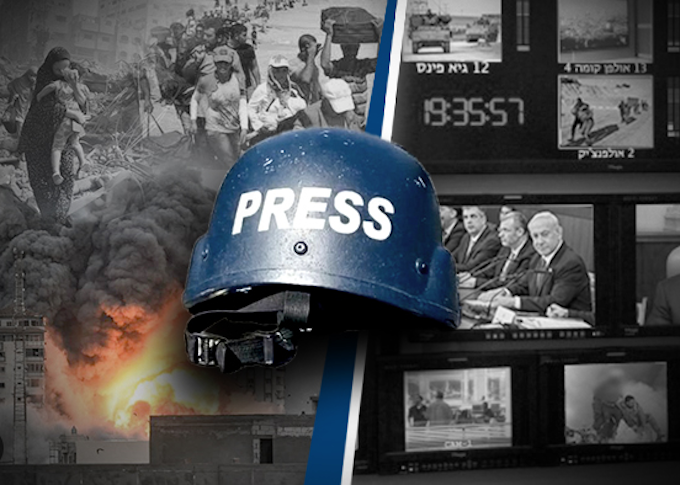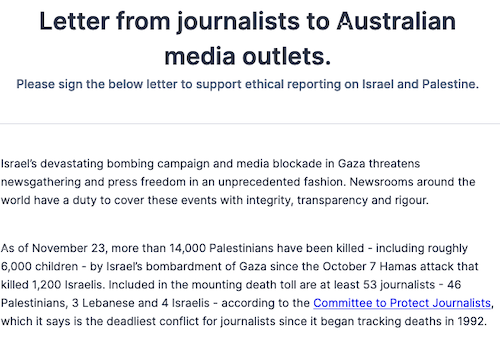
By Cam Wilson in Sydney
A senior Nine staff journalist has resigned and readers are angrily cancelling their newspaper subscriptions as Sydney Morning Herald and Age editors defend a decision to ban staff who signed a letter protesting about Australian media’s handling of the Israel-Gaza conflict from covering the war.
The fallout continues from a last Friday afternoon announcement in response to the open letter addressed to Australian newsrooms that called on them to “support ethical reporting on Israel and Palestine”.
The petition, which had more than 100 signatures from journalists, including some from Nine’s mastheads, advocated covering credible allegations of war crimes and disclosing whether staff had taken sponsored trips to the region.
- READ MORE: Which Australian journalists and politicians have gone on trips to Israel and Palestine?
- Open letter from journalists to Australian media outlets
- War on Gaza live: Israel resumes bombing after truce expires
Editors for Nine’s metro papers SMH, The Age, Brisbane Times and WAToday — comprising executive editor Tory Maguire, SMH editor Bevan Shields, Age editor Patrick Elligett and SMH national editor David King — reacted by saying they would remove any staff who signed the letter from reporting or producing content related to the war.

Following the letter, the editors organised an in-person meeting on Tuesday morning and invited Nine’s signatories to the open letter along with the mastheads’ house committee members of journalist union Media, Entertainment and Arts Alliance (MEAA).
According to five staff who spoke to Crikey on the condition of anonymity, little was known about the meeting prior to it being held. Initially, some staff were concerned the meeting would be about further repercussions for the letter’s signatories while others wondered if the editors were planning on softening their stance.
What became clear soon into the 90-minute meeting was that the editors had no intention of backing down. Multiple staff described them as “doubling down” in a “tense” meeting.
‘Mostly defensiveness’
“I would say the vibe was a lot of open discussion but mostly defensiveness from the editors,” one staff member told Crikey.
Editors stressed that their decision to sideline staff who had signed the letter was motivated by a desire to protect their mastheads’ reputations from a perception of bias.
They argued that the bans — while saying they were hesitant to use the word “ban” to describe them — were not punitive and were set to last as long as the conflict does.
A point of contention was the “hypocrisy” of treating staff as potentially biased for signed the letter about media coverage, while not applying that same standard to staff who have attended sponsored trips to Israel. (Crikey reported earlier this week that Maguire, Shields, Elligett and King have all made such trips.)
When one editor raised that a hypothetical reader coming across a Nine journalist’s name on the open letter would affect their perception of the paper, a staff member asked why it would not be the same for someone who had been on a trip, especially given that they were not required to disclose it.
While saying that going on a junket “years ago” would not affect a journalist’s coverage, editors singled out two journalists in the newsroom for having gone on trips — one supported by a movie studio and the other by environmental advocacy group Greenpeace — and whether they would need to disclose this.
In both cases, these journalists, who declined to comment to Crikey, had disclosed the relationship as part of their coverage.
“They [the editors] tried to make comparisons that weren’t really comparisons,” one journalist said.
‘Punished’ over backgrounds
Staff also used the meeting to raise concerns about what management was doing to retain diverse staff, describing feeling as being “punished” for their own backgrounds.
Maguire, Shields, Elligett and King did not respond to questions from Crikey about the meeting, including asking what Nine’s leadership was doing to retain diverse staff. A Nine spokesperson responded with a general statement instead.
“The editorial leaders are in constant communication with a vast range of newsroom staff, representing all perspectives, and will continue to encourage open dialogue on all issues, including this one,” they said in an emailed statement.
Shortly after the meeting on Wednesday afternoon, 17-year Age veteran and environment reporter Miki Perkins posted on X (formerly known as Twitter) that she was resigning from her role.
“I have made the decision that it’s time to seek broader horizons and I will be leaving,” she wrote.
Perkins, who hopes to stay working in journalism, was one of the journalists singled out in the meeting and had been assisting in circulating the open letter to journalists. She did not mention the meeting but Age staff believe that Nine management’s handling of the matter was the final straw.
Angry comments
Meanwhile, Nine’s Slack channel #feedback-smh-website, which automatically posts responses to a feedback survey, has been filled with angry comments from current and former readers who took issue with the editors’ response to the letter.
One metro paper journalist said that the last time they had seen such directed reader feedback was during the backlash to SMH‘s outing of Rebel Wilson.
“My family has been a subscriber to the Age consistently for around 100 years — but this is too far. Please end my subscription immediately,” wrote one respondent.
“Vale Herald. You shall be missed,” wrote another.
Cam Wilson is a journalist for the independent Crikey website in Australia. Republished by Pacific Media Watch.












































